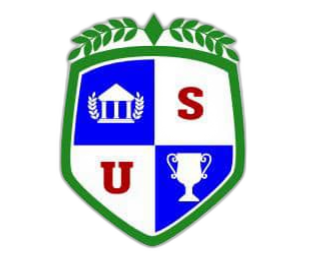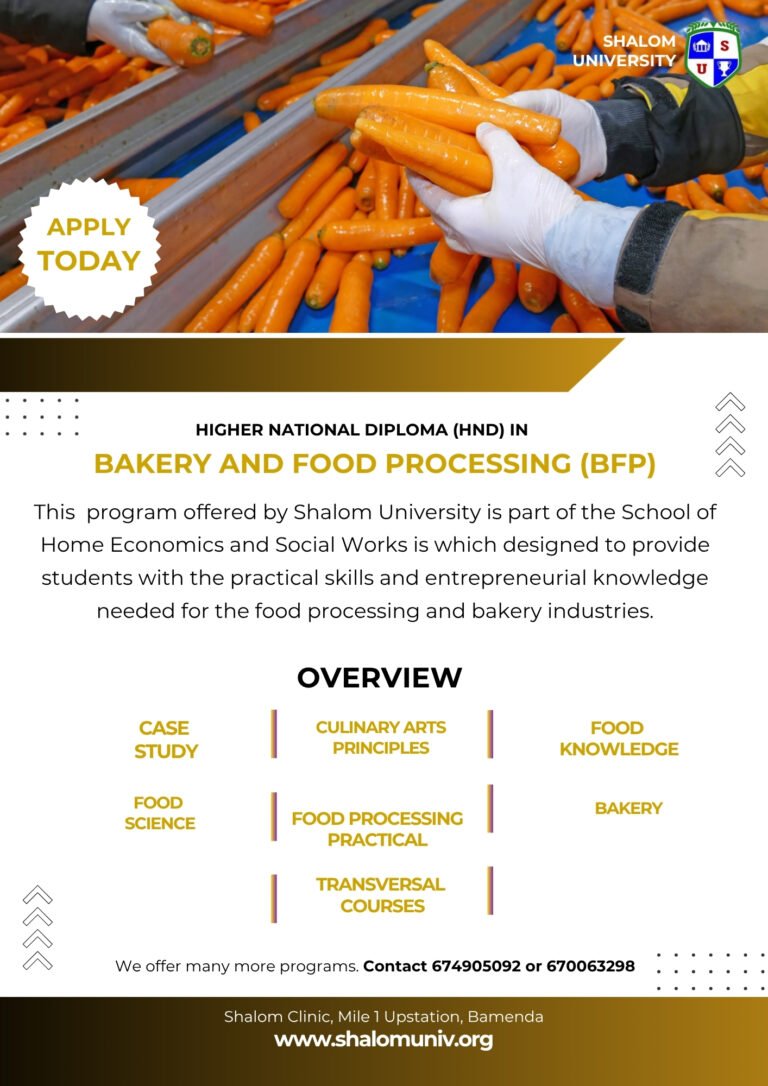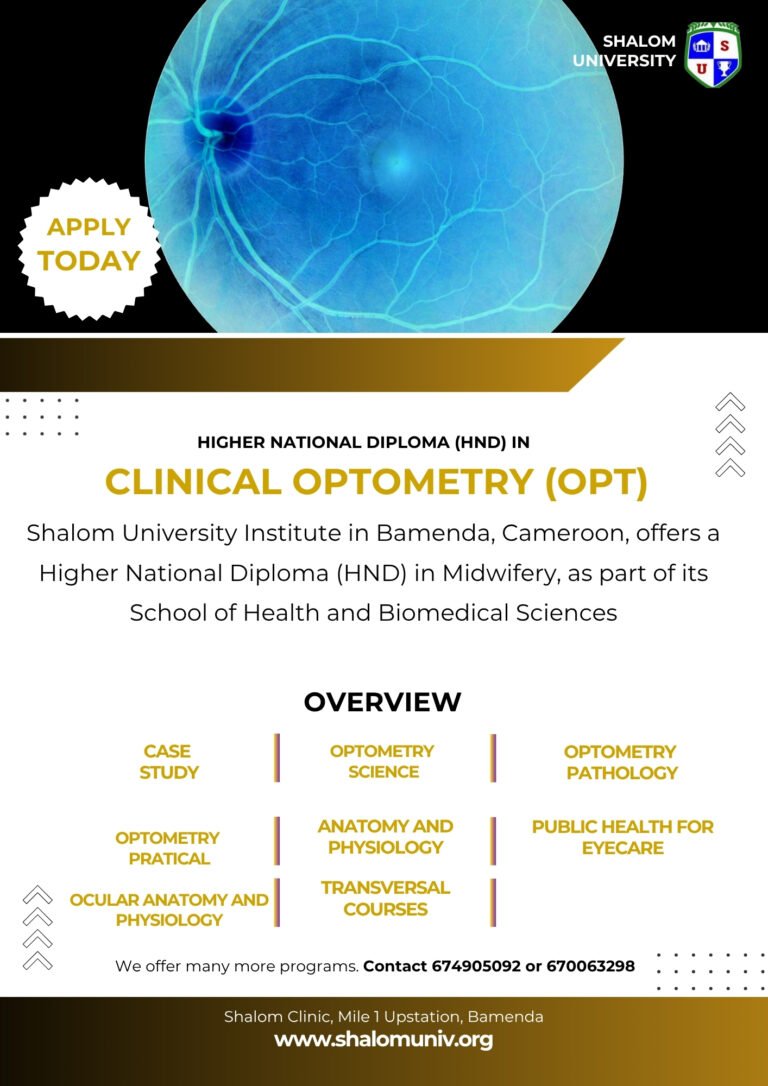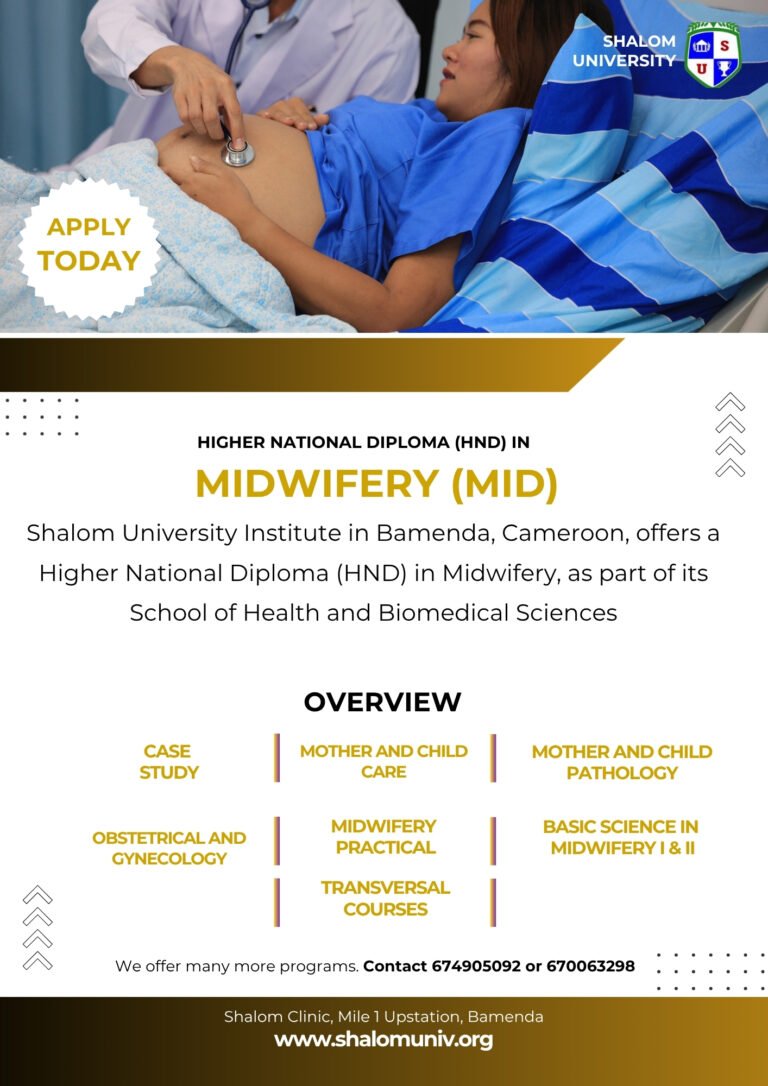The ability to move freely and without pain is often taken for granted, but for those recovering from injury, managing a chronic condition, or facing physical disabilities, the role of a physiotherapist is invaluable. In Cameroon, the demand for skilled physiotherapists is growing, particularly with the increase in road traffic accidents, non-communicable diseases, and conditions related to an aging population. The HND in Physiotherapy at Shalom University in Bamenda is designed to meet this demand, offering a comprehensive and practical program that prepares students to restore function, improve mobility, and enhance the quality of life for their patients.
The program at Shalom University is rooted in a curriculum that balances a strong foundation in medical sciences with the hands-on, patient-centered skills required for effective physiotherapy. Graduates are equipped to serve in various healthcare settings across Cameroon, from hospitals and rehabilitation centers to private clinics and community-based programs.
The PHY Curriculum at Shalom University
The HND in Physiotherapy program at Shalom University is built around a series of core papers that guide students from basic scientific principles to advanced clinical application.
Paper: Anatomy and Physiology
This foundational course provides a comprehensive understanding of the human body’s structure and function. For a physiotherapist, this knowledge is paramount, as it informs every aspect of patient assessment, treatment planning, and rehabilitation. In the context of Cameroon, where diverse etiologies for physical impairments exist, from infectious diseases to chronic conditions, a solid understanding of anatomy and physiology is critical.
Key topics include:
- Musculoskeletal System: A detailed study of the bones, joints, muscles, ligaments, and tendons, which are the primary focus of physiotherapy.
- Nervous System: An understanding of the central and peripheral nervous systems is essential for treating neurological conditions like stroke or spinal cord injuries.
- Cardiovascular and Respiratory Systems: Knowledge of these systems is crucial for physiotherapists involved in cardiac and pulmonary rehabilitation.
- Kinesiology: The science of human movement, which applies anatomical principles to understand motion.
Paper: Physiotherapy Science
This paper delves into the scientific principles that underpin physiotherapy practice. It moves beyond general anatomy and physiology to focus on the specific concepts and evidence-based theories that guide therapeutic interventions.
The curriculum covers:
- Biomechanical Principles: The study of forces and their effects on the body, which informs how physiotherapists analyze movement and design effective exercises.
- Therapeutic Modalities: The application of various physical agents for therapeutic purposes, such as heat, cold, electrical stimulation, and ultrasound.
- Exercise Physiology: The physiological responses to exercise and how to use exercise to improve physical function, endurance, and strength.
- Medical Terminology: Mastery of medical terminology related to musculoskeletal, neurological, and cardiopulmonary conditions, ensuring clear communication within the healthcare team.
Paper: Physiotherapy Pathology
Physiotherapy Pathology focuses on understanding the nature, causes, and progression of diseases and conditions that result in physical impairments. This knowledge is essential for accurately diagnosing patients and developing appropriate treatment plans.
Key areas of focus include:
- Orthopedic Conditions: Common conditions affecting the bones and joints, such as fractures, arthritis, and back pain, which are frequent causes of physical disability in Cameroon.
- Neurological Conditions: Pathologies of the nervous system, including stroke, cerebral palsy, and traumatic brain injury, which require specialized rehabilitation.
- Cardiopulmonary Conditions: Diseases of the heart and lungs, such as asthma and heart failure, where physiotherapy plays a key role in improving function and endurance.
- Pediatric and Geriatric Conditions: Understanding the specific pathologies and rehabilitation needs of children and older adults.
Paper: Public Health for Physiotherapists
In Cameroon, a public health perspective is crucial for any healthcare professional, including physiotherapists. This paper prepares students to address musculoskeletal and other physical health issues on a broader, community-wide scale.
The curriculum addresses:
- Epidemiology of Disabilities: The study of the distribution and determinants of physical disabilities in the Cameroonian population.
- Community-Based Rehabilitation (CBR): Implementing rehabilitation programs in community settings, which is essential for reaching individuals in rural or underserved areas.
- Injury Prevention: Designing and implementing programs to prevent common injuries, such as those related to workplace hazards or road traffic accidents.
- Health Promotion: Educating the public on the benefits of exercise, proper ergonomics, and maintaining a healthy lifestyle to prevent physical impairments.
Paper: Physiotherapy Practical
This is the hands-on, clinical training component of the program, where students apply their theoretical knowledge in a supervised, real-world setting. Practical experience is fundamental to developing the competencies needed for effective physiotherapy practice.
The practical training includes:
- Patient Assessment: Mastering the techniques for assessing a patient’s range of motion, muscle strength, gait, and functional ability.
- Manual Therapy: Developing skills in hands-on techniques, such as massage, joint mobilization, and soft tissue release.
- Therapeutic Exercise Prescription: Learning to design individualized exercise programs for patients based on their specific needs and goals.
- Clinical Rotations: Supervised experience in various clinical settings, including hospitals, rehabilitation centers, and specialized clinics, providing exposure to a wide range of patient conditions.
Paper: Case Study
The Case Study paper is the capstone of the HND program, integrating all the theoretical and practical knowledge gained throughout the course. It challenges students to analyze comprehensive patient scenarios, from initial diagnosis to treatment planning and follow-up. This is particularly relevant for physiotherapists in Cameroon, who may need to work with limited resources and make sound clinical judgments.
The course trains students to:
- Develop a comprehensive treatment plan: Based on a given patient case, students must devise a complete treatment plan that addresses all diagnosed physical impairments.
- Consider all factors: Students must consider patient-specific factors, such as socioeconomic status, cultural beliefs, and access to assistive devices, which are all significant in the Cameroonian context.
- Justify their decisions: During formal presentations, students must justify their diagnostic and treatment choices, demonstrating their clinical reasoning and critical thinking skills.
- Reflect on professional practice: The process encourages students to reflect on their skills, communication strategies, and ethical responsibilities.
Improving Mobility and Life in Cameroon
Graduates of the HND in Physiotherapy from Shalom University are well-prepared to make a significant impact on the health and well-being of the Cameroonian population. They possess the skills to provide evidence-based care for a wide range of physical conditions, from managing chronic pain to rehabilitating patients after surgery or injury. The program’s blend of theoretical knowledge, practical training, and a public health focus ensures that graduates are not only clinically competent but also equipped to address the broader physical health needs of the community. By training skilled physiotherapists, Shalom University contributes directly to improving mobility, functionality, and the overall quality of life for countless Cameroonians.




